I’ve shared over time on the site a variety of pieces of information about slot machine paybacks, but let’s cut to the chase. On a Vegas-style slot machine, how low can those paybacks actually be set?
If it’s in a modern casino, made my a major slot manufacturer, the answer probably is about 85%. I’ve spoken to a number of manufacturers and game designers, and that number is the low end that comes up each time when we’re talking games made today. Some companies even list the payback ranges of some of their games, and there, too, 85% seems to be the predominant floor.
Now, is it some sort of a coincidence that many manufacturers have the same bottom end in mind? Do they all just sort of coalesce on certain numbers? It’s actually simpler – there are certain customers that want it, and for the games to sell to those customers, they need to offer it.
If you look at paybacks in the Atlantic City and Las Vegas markets, you can see where there’s definitely evidence these settings are in use today. And the picture at the top of the article, which comes off a cruise ship, reminds that cruise ships tend to take the low end option on paybacks too, so they’re going to be at that lower end of 85% on penny slots.
Now, what about the fact some like to state that Nevada (among others) allows payouts below 85%, or that markets like California have no set floor? It’s certainly possible that someone has designed games below 85%, but if they’re buying from the major manufacturers those same Vegas-style slot machines, they’re going to be generally designed with the same options. Although not impossible, it’s rare for a game to ship out differently in different markets.
Even when looking into other systems, like Historic Horse Racing, the parimutuel math models don’t tend to go below that range either, including data posted by companies like Exacta Systems, which list the house hold options for their games on their site too.
Could there be non-top-tier brands that sell machines placed in places like gas stations or less reputable facilities that aren’t set up to pay the same? Could a top tier brand have specific games that can go lower? Absolutely. This is not saying that there isn’t anybody designing things like that. But as a pretty general rule, if you’re looking at the major players in the industry, whose games are recognizable on the casino floor, your paybacks are going to be in a pretty predictable range.
This also presumes you’re wagering to maximize your payout potential – there are games that, if you don’t bet enough coins or max bet to activate everything, you could see your payout shaved from the best possible payout, and that could cause you to slip below a certain percentage.
Another presumption: You’re in a standard casino floor in a standard Vegas-style slot machine market. Veer outside the norm, and you might find examples of games that are worse than what you’d find on the Las Vegas strip.
However, this also presumes you’re playing modern slots designed recently. Why is that? If you look at historic slot payback data, slots used to pay more. And that’s because in part they weren’t designed with such low payback options. PAR sheets from an earlier era hint at the fact that games used to ship with higher payback options. Older penny slots were many times designed with higher minimum payouts than the 85% floor that’s pretty much the standard today.
What changed? Well, as mentioned, certain companies demanded lower payback settings, in part because they believed players couldn’t tell the difference. And, over time, the game developers, not wanting to lose certain clients, acceded to those wishes. Who are these clients? It’s not the sort of thing you’ll generally be told directly, but there’s plenty of hints in that publicly reported payback data that will inform at least some of who’s gone that route based on the data of how much their machines pay out.
So, if you are one of those players who worry about payback options, here’s things you can think about:
- Use the public payback data to understand, especially for the larger players, who pays better than others.
- Remember that higher denomination machines are generally set to pay a better percentage than lower ones. Higher denomination doesn’t have to mean a higher wager – you can bet $3 on pennies and $3 on $1 machines, for instance.
- Older machines may pay better because they were designed when settings were often times better. Looking for older machines, whether video or mechanical, may help you get a better overall payout.
- The same game on a newer machine may pay worse than an older machine because the payback options have been adjusted to reflect the expected current offerings. Finding an original Goldfish machine versus the remade Goldfish Classic, as an example, could matter. If you see two versions of the same game, it’s generally not hard to tell which one has been on the casino floor a lot longer.
- Many casino companies have been over time been looking at the relative theoretical payback when it comes to determining comps. MGM is one of the more recent to take this path with how you earn Express Comps, although Venetian/Palazzo have done so for years, and a few years ago Steve Bourie wrote about telling the payback on a machine at the Hard Rock casinos in Florida based on how quickly you earn comp dollars. So you can also potentially use how quickly you earn comp dollars on a machine to figure out to some degree how good or bad the game you’re playing is.
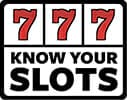

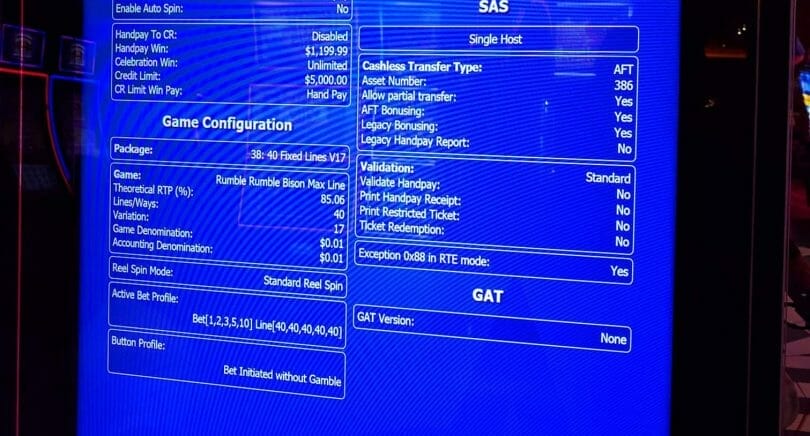
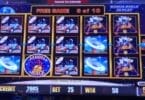
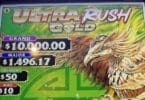
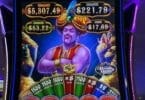
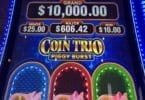

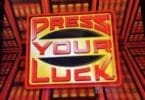
Joshua, I have a question I’ve wondered about years. When gaming jurisdictions report slot payout percentage, does it include their video poker inventory? if they did, wouldn’t it bump up the percentage?
I’ve wondered if casinos would due that, bumping the 85% up to the 88/89 penny slot % often seen when listed in Casino Player, for example?
Generally speaking, Video Poker machines are included in those percentages (and Casino Player says so in its box explaining things at the top of the listings). But of course there’s generally not many (if any) Video Poker machines at pennies in most casinos, and it’d certainly be heavily diluted by penny slots when they do exist. At quarters and dollars, the machine count is going to be more influential in payout reporting, and part of why, I think anyway, downtown Las Vegas looks better in the data than the strip – Video Poker has a larger sway.
Joshua: I read on many other sites information that odds/percentages on slots in Vegas are changed frequently; weekend odds are worse than weekdays, for example, and odds can even changes in the course of a day, with the flip of a switch–as long as a machine is idle. When I check out the Nevada Gaming Commission rules, however, it seems that changing the odds on a bank of machines–with the flick of a switch– is not actually allowed. When I research this subject on the internet, I find references to a trial at Treasure Island with server-controlled machines, which allowed this sort of frequent and easy odds revision. I find no source that confirms this is now the practice in a majority of Vegas Casinos. Any information you might have on this topic would be welcome!
Hey Dale! I’ve tackled that subject elsewhere on the site. Here’s a link:
https://www.knowyourslots.com/do-casinos-change-payback-based-on-day-time-or-specific-situations/
In that article is a specific quote taken from a strip casino executive, who basically says the tech never really worked out, and was more focused on changes like denominations and bet levels. You’re right in that basically the casinos need to keep their documentation up to date, so if they’re inspected what’s on the floor matches what they have recorded as the configuration. When it comes to Vegas you can presume that it’s not really something employed; in other markets where the rules may be looser it’s certainly possible, but short term variance can overtake some nominal benefit in tinkering with the paybacks constantly so most casinos in practice set it and forget it.